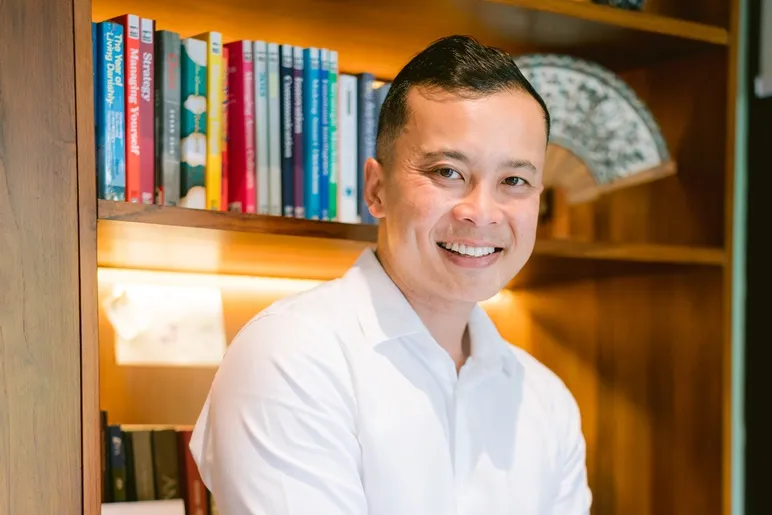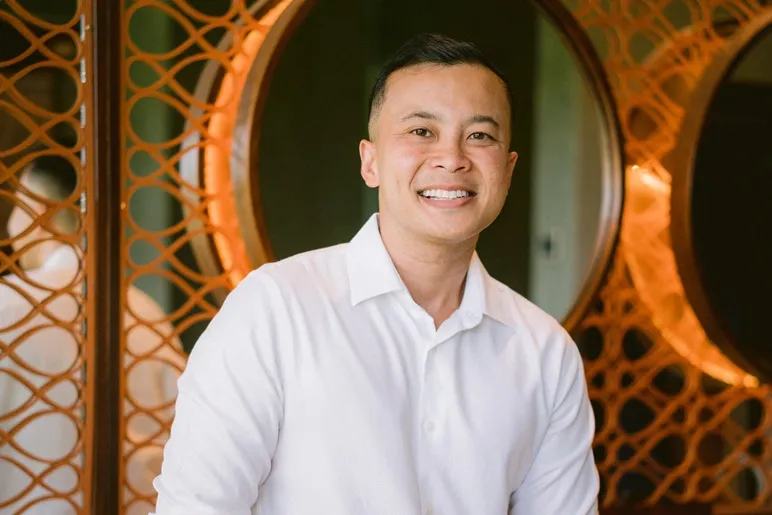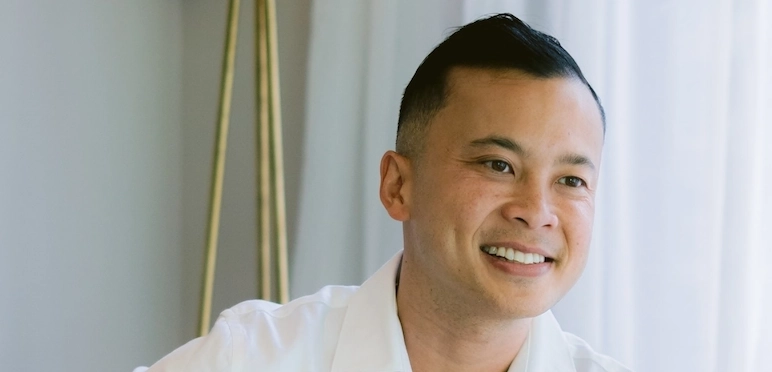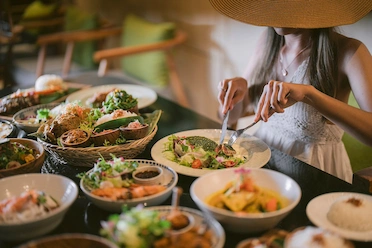In this exclusive interview, we sit down with Bayu Hendro Sarwono,In this exclusive interview, we sit down with Bayu Hendro Sarwono, the visionary founder of Samsara Ubud Resort and the co-founder of Samsara Samudra phinisi boat, to delve into his remarkable journey from the world of high-stakes finance to pioneering a transformative hospitality brand. With a background in prestigious consulting roles in Australia and a deep passion for sustainability and cultural heritage, Bayu's story is one of bold decisions and profound insights. From the motivations behind launching Samsara to the approach of blending luxury with environmental consciousness, the aspiring entrepriser discusses the challenges and triumphs of reshaping Bali’s tourism industry. Discover more about his journey, vision for Samsara, and thoughts on the future of Bali’s tourism by reading the full interview below!
With a background in prestigious consulting roles in Australia and a deep passion for sustainability and cultural heritage, Bayu's story is one of bold decisions and profound insights.
You had a thriving financial career in Australia, consulting clients with billion-dollar funds. What made you leave that stability to start Samsara in Indonesia?
Looking back, it was probably the optimism of youth. In my late 20s, I started wondering what it would be like to run my own business. My career in finance was fulfilling—I worked with pension funds, government bodies, and family offices—but there was always a curiosity about hospitality, especially hotel management. I remember visiting a boutique resort in Yogyakarta that left a lasting impression on me. My travels as an investment consultant took me to cities like Shanghai, Tokyo, New York, and London, where I experienced remarkable hotels. That exposure sparked my interest in creating something of my own. Of course, I didn’t fully anticipate the challenges ahead. If I could do it all over again, I’d probably take a more measured approach—less ambitious and more focused on enjoying the journey. Our culture often glorifies the hustle, but it's important to find balance and avoid burnout.

The name ‘Samsara’ carries deep spiritual significance. What does it mean to you personally, and how does it reflect your vision for the brand?
Some friends from Hindu and Buddhist backgrounds initially questioned my choice of name. But for me, Samsara represents life’s journey—a continuous cycle of growth and transformation. If we had already reached Nirvana, we wouldn’t be here. This philosophy is embedded in everything we do at Samsara. Our experiences encourage guests to slow down, reconnect with nature, and embrace new perspectives. Whether it’s village walks in Ubud, painting classes, or immersive experiences in remote destinations like Raja Ampat, we aim to remind guests—and ourselves—that nothing in life is permanent. Travel should offer more than luxury; it should offer insight and meaning. I challenge my team to design experiences that are both impactful and perspective-shifting. If a guest leaves Samsara with a renewed sense of appreciation for the world, we’ve done our job right.
“Luxury and sustainability can coexist when built on authenticity and intention.”
What are the biggest challenges facing Bali’s tourism sector today, and what solutions do you believe will create a long-term impact?
In my younger years, I might have jumped to criticize, but now I take a more solution-oriented approach. Two major issues stand out: traffic management and waste management. No one flies across the world to spend three hours in traffic. Efficient transportation infrastructure is crucial for Bali’s growth. We also need better waste management. Cities like Banyumas have made impressive strides in this area—what can we learn from them? Or from Singapore’s efficiency? Public transport is inevitable if we want tourism to be sustainable. But change requires a mindset shift. Whenever the government proposes initiatives like an MRT system, the response is often skepticism. Instead of constant criticism, we need to support well-intentioned efforts from the Government. Bali’s future depends on how we position ourselves in a rapidly evolving global tourism landscape. Many destinations are aggressively promoting themselves—we must carve out a clear and unique identity.
Sustainability is integral to Samsara Ubud. Given your background in environmental management accounting, how do you integrate sustainability without compromising luxury?
Sustainability has always been a passion of mine. At 20, I wrote my thesis on environmental management accounting at Monash University—back when sustainability wasn’t even a mainstream topic. It’s something I’ve believed in for a long time, but applying it to the hospitality industry required a thoughtful approach. At Samsara, we take a holistic approach to ESG (Environmental, Social, and Governance) practices. Whilst many focus solely on the environmental aspect, true sustainability encompasses more. We’ve eliminated single-use plastics, source local produce, and ensure 80% of our team are local hires. But beyond that, we’re committed to meaningful governance—practices that create long-term benefits. To be honest, we’re still evolving, and I feel like we could still do better in many ways. But our goal is clear: luxury and sustainability can coexist when built on authenticity and intention. Our approach is to create experiences that are not only indulgent but also responsible, proving that high-end travel and environmental consciousness can go hand in hand.
"If we had already reached Nirvana, we wouldn’t be here. This philosophy is embedded in everything we do at Samsara… Travel should offer more than luxury; it should offer insight and meaning."
Luxury resorts and luxury cruises are two different playing fields. What inspired you to create Samsara Samudra, and what vision drove you to bring luxury hospitality from land to sea?
My inspiration for Samsara Samudra came from my fascination with Phinisi-designed cruises (PDC). I realized there was an opportunity to blend traditional Indonesian heritage with modern luxury experiences. When I saw other companies successfully executing this concept, it made me think—why not create something that feels distinctly Indonesian while appealing to a global audience? Indonesia is the world's largest archipelagic nation, rich in hidden gems, and I wanted to offer travelers the chance to explore these remote islands without the hassle of constantly packing and unpacking. The experience on a large luxury cruise ship, while luxurious, doesn’t truly reflect our culture. Samsara Samudra aims to change that by offering an experience that is both deeply rooted in our heritage and modern in design, bridging the gap between the traditional and the contemporary. It’s all about presenting Indonesia’s heritage in a way that appeals to a global market, while providing the freedom to explore hidden destinations like the Forgotten Islands, Banda Islands, Alor, and Kaimana. This is the essence of Samsara Samudra: modern luxury with an Indonesian soul.
You’ve explored the world, from finance hubs to hidden island paradises. What’s the most unforgettable or even borderline crazy experience you’ve had while traveling?
For work, one of the most memorable—and challenging—experiences I had was traveling to Bismarck, North Dakota, in the winter of 2013. Back then, I was still working in finance, and we had to visit a shale gas site in the middle of nowhere to assess an investment thesis. I wasn’t prepared for what was to come. We drove in minus 30 degrees Celsius, and I remember stepping out of the car, trying to clean off the snow, and my fingers went numb in seconds. The freezing conditions and the blizzard during our flight from New York made the entire trip feel surreal. Bismarck is one of those places that not many people have heard of, so to be able to say I went there—especially during the coldest winter imaginable—is something I’ll never forget. For leisure, one of my most life-changing experiences was visiting Zambia. I was only 22 years old, but I decided to embark on a safari adventure that would alter my perception of the world. After flying from Sydney to Perth, then Johannesburg to Lusaka, I took a small four-seater plane to a remote camp. The place was so secluded that the runway was just bare land. What struck me most was the vastness of nature; the unspoiled wilderness stretched endlessly. The safari allowed me to immerse myself in nature in a way I hadn’t experienced before. The raw beauty of Africa and the humbling experience of seeing wildlife in its natural habitat completely changed me. I fell in love with Africa and it remains one of the most unforgettable travels I’ve ever had.

You’ve built a reputation as a luxury hospitality expert and entrepreneur. What’s something about you that people would be surprised to learn?
People might be surprised to learn that I have a deep passion for poetry. Writing has been a cathartic outlet for me—something that many don’t associate with my public persona. I’ve written over 30 poems, which I’ve compiled into a book. Although the book is completed, it’s something very personal, and I haven’t shared it publicly yet. I may decide to publish it under a pseudonym to maintain the anonymity. The poems reflect my experiences with grief, particularly the loss of my parents, and the emotional journey I went through, including coping with stress, uncertainties and dealing with my own insecurities. Writing these poems became my healing process, and it helped me express emotions I didn’t know how to process otherwise. Beyond poetry, I’m also an avid tennis player. Growing up, I was part of the junior league, and I’ve always loved the sport. For me, tennis is a form of meditation. It allows me to clear my mind and focus on something purely physical for a while. It’s also a great way to stay healthy and manage stress. I’m grateful that I’ve found this outlet, as it’s helped me cope with life’s challenges. In hindsight, I wish I had discovered healthier coping mechanisms earlier in life, as I went through a period where I relied on unhealthy habits to deal with stress and to some extent a lack of self-worth and insecurity. Today, I focus on playing tennis as a healthy escape, and it’s one of the most grounding activities in my life.
“I want my life to serve as a reminder that humans are multi-dimensional, and it’s okay to make mistakes whilst discovering your ‘identity’ and to have a wide range of passions and interests.”
How do you want to be remembered?
That’s a powerful question and one that’s often left unexplored. It really makes you reflect on your purpose in life. I hope to be remembered as someone who embraced being multi-dimensional. We often categorize people based on their professional lives, hobbies, or interests, but I believe it’s important to recognize that we are more than just one thing. I want to inspire others to embrace all aspects of themselves—whether it’s their passion for business, art, literature, or spirituality. For me, there’s no need to separate these facets. I’m someone who is not only passionate about business but also about spiritual growth and self-expression. I hope my legacy encourages others to break free from the boxes society tries to put them in. I want my life to serve as a reminder that humans are multi-dimensional, and it’s okay to make mistakes whilst discovering your “identity” and to have a wide range of passions and interests. Ultimately, I want to be remembered as someone who was deeply devoted to his craft.




 Billy Bagus
Billy Bagus
 May 06, 2025
May 06, 2025




